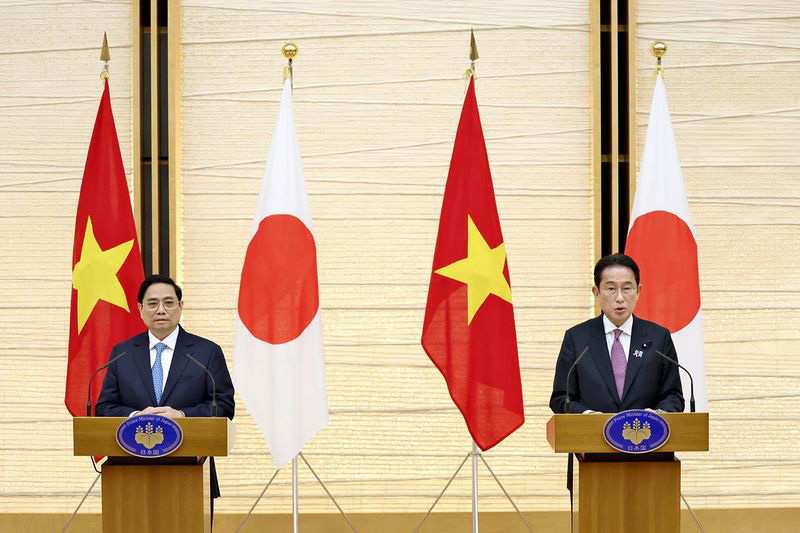To boost decarbonization, Japan seeks more nations to join its emissions trading plan

Prime Minister Fumio Kishida, right, and Vietnamese Prime Minister Pham Minh Chinh hold a joint press conference in Tokyo on Nov. 24, 2021.
16:41 JST, January 6, 2022
Aiming to lead the global decarbonization movement and helping Japan decarbonize, the government plans to expand greenhouse gas emissions trading by increasing the nations covered by a so-called joint collaboration plan, which will be drawn up together with developing countries.
Vietnam has already drawn up the plan with Japan, and the government hopes to expand it to other Southeast Asian nations, with a view to working with African countries as well.
Under the Joint Crediting Mechanism, the government and private companies provide technologies for decarbonization, such as the introduction of solar and wind power generation, to partner countries. Based on the amount of reduction in emissions in the partner countries, Japan can receive some of the emissions credits from those nations.
The government plans to compile the collaboration plan with countries that have already signed the mechanism, a framework that originated in 2013 between Japan and developing countries. During the COP26 U.N. climate summit held in Britain in November last year, emissions trading through the mechanism was internationally recognized.
Currently, the Japanese government has signed the mechanism with 17 countries in Asia, Africa and Latin America. In November last year, Japan and Vietnam signed the joint collaboration plan that covers concrete measures such as technical assistance and reduction targets.
As decarbonization technology has yet to be widely used in many countries, the government hopes to increase the nations that draw up collaboration plans, hoping to make the cooperation effective in the fight against global warming.
In some developing countries, there is room for Japanese assistance in calculating the current greenhouse gas emission level and future estimates. To this end, the plan is expected to include exports of a system for predicting future greenhouse gas emissions and support for developing a national strategy for decarbonization for each country.
The government also plans to set up a joint working group to confirm progress on the reduction target on a regular basis.
For the time being, the government plans to prioritize drawing up plans with Indonesia and Thailand to counter China’s growing influence in Southeast Asia. In the future, the government hopes to draw up plans with African countries that have signed the mechanism with Japan, such as Kenya and Ethiopia.
The government has set a target of reducing greenhouse gas emissions by 46% from fiscal 2013 levels by fiscal 2030. It is expected that 100 million tons of emissions will be reduced through the mechanism, which is equivalent to about 8% of Japan’s total emissions in fiscal 2019. At present, however, the forecast is only for a reduction of 19.2 million tons.
The government hopes to expand the number of countries compiling the collaboration plan, aiming at steady progress on the reduction target.
A senior official of the Environment Ministry said, “We would like to make our contribution to the global trend of decarbonization by increasing the number of countries signing the mechanism and compiling the collaboration plan.”
Top Articles in Science & Nature
-

Japan Institute to Use Domestic Commercial Optical Lattice Clock to Set Japan Standard Time
-

iPS Treatments Pass Key Milestone, but Broader Applications Far from Guaranteed
-

Record 700 Startups to Gather at SusHi Tech Tokyo in April; Event Will Center on Themes Like Artificial Intelligence and Robotics
-

iPS Cell Products for Parkinson’s, Heart Disease OK’d for Commercialization by Japan Health Ministry Panel
-

Japan to Ban Use of Power Banks on Airplanes
JN ACCESS RANKING
-

Japan PM Takaichi’s Cabinet Resigns en Masse
-

Japan Institute to Use Domestic Commercial Optical Lattice Clock to Set Japan Standard Time
-

Israeli Ambassador to Japan Speaks about Japan’s Role in the Reconstruction of Gaza
-

Man Infected with Measles Reportedly Dined at Restaurant in Tokyo Station
-

Videos Plagiarized, Reposted with False Subtitles Claiming ‘Ryukyu Belongs to China’; Anti-China False Information Also Posted in Japan
























